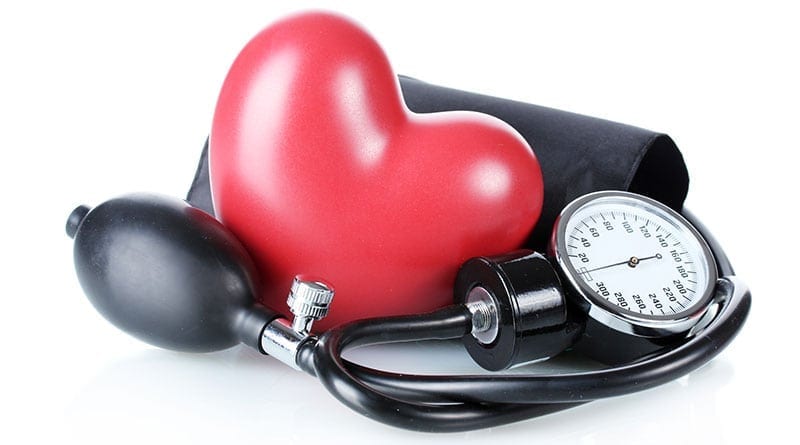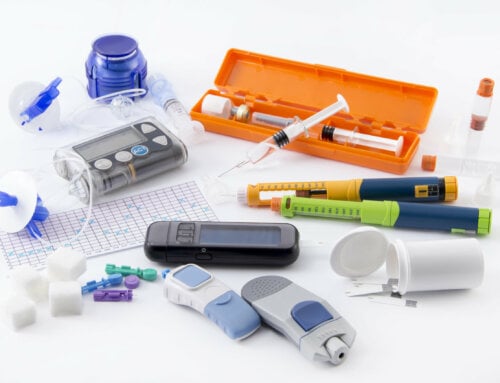Virtually all people with diabetes know that they must regulate their blood sugar in order to remain healthy and prevent complications. But did you know that checking your blood pressure is equally important for people with diabetes? The combination of diabetes and high blood pressure doubles your risk for cardiovascular disease.
The Connection between High Blood Pressure and Diabetes
High blood pressure, or hypertension, affects up to 60% of people with diabetes. It can also factor into the development of complications such as eye disease and kidney disease, or make these symptoms worse if they already exist. Even if you do not have hypertension, you should be aware that diabetes can lead to high blood pressure. Diabetes can damage your arteries, making it more likely that you will develop atherosclerosis. Atherosclerosis, or hardening of the arteries, is one of the causes of hypertension.
Complications of Diabetes and High Blood Pressure
Hypertension is a complication often associated with diabetes. If left untreated, high blood pressure can lead to other health issues such as blood vessel damage, heart attack, heart failure, stroke, or kidney failure. It can lead to peripheral vascular disease, which affects the arteries in the feet and legs. Using a blood pressure monitor regularly is important. Early detection and diagnosis can help reduce the risk of health complications associated with hypertension.
Detecting and Diagnosing Hypertension
It can be difficult to know if you have hypertension unless you regularly check your blood pressure at home with follow-up appointments with your physician. Some people experience symptoms of hypertension while others may have none. Those who do have symptoms may experience dizziness, fatigue, blurred vision, and headaches. According to the American Heart Association, your blood pressure reading should be 120/80 or less. The American Diabetes Association states that your reading should be 140/80. Talk to your doctor about which reading you should attain.
Discuss Prehypertension with Your Doctor
If your blood pressure is at the higher end of normal, it is referred to as prehypertension. It can be a warning of future hypertension. Lifestyle changes can help reduce your blood pressure and minimize the risk of developing heart problems. Know your numbers and check your blood pressure at random times of the day. The systolic pressure (top number) is the pressure in your arteries when your heart beats and fills with blood. The diastolic pressure (bottom number) is the resting time between beats as your heart fills with blood. Always have your blood pressure checked during medical exams and ask your doctor the actual numbers so you stay informed. Bring your home documented readings to your visit for comparison.
Preventing Hypertension
There are many steps you can take to help control or prevent hypertension. Reducing your intake of salt is one of the most important, along with quitting smoking. Caffeine and alcohol may also elevate your blood pressure, and should be avoided or consumed in moderation. Blood pressure is also tied to your weight as the more you weigh, the harder your heart must work to pump the blood through your body. Losing just a few pounds may help alleviate or reduce high blood pressure. Weight reduction may also allow the doctor to lower or remove blood pressure medication.
Heart-Healthy Dietary Choices
Eating a balanced diet can help to reduce the risk of high blood pressure. The Mediterranean diet is often referred to as a heart-healthy diet that also fits into the dietary requirements of people with diabetes. Choose green, leafy vegetables, fresh fruits, lots of fish, whole grains, and herbs and spices for flavoring. Eat only small amounts of lean meats and low fat dairy. Have a glass of dry red wine if you are a drinker. Cook with small amounts of extra virgin olive oil. Avoid added salt, which includes the preservatives found in packaged foods and fast foods. Fresh foods are best. Instead of using salt, add flavor to foods with herbs such as oregano, rosemary, and garlic. Add heart-healthy foods to your diet, such as tuna or salmon with omega-3s and berries with phytonutrients as well as oatmeal, tomatoes, and broccoli.
Other Ways to Reduce the Risk of Hypertension
Aerobic exercise is really good for your heart. This includes running, walking, swimming, biking, and aerobic fitness classes. Include thirty minutes of aerobic activity into your day. This can be done in intervals of ten minutes, three times a day if you have a hectic schedule. Just move more all day long. A sedentary lifestyle increases your risk of heart problems. If you smoke, it’s time to quit. If you have difficulty kicking the habit, consider a smoking cessation clinic, hypnosis, or other techniques that have been recommended by your doctor.
Minimizing Stress

Managing Stress
Stress may be unavoidable. Learning to manage stress can make a real difference. Take three deep breaths when a stressful situation occurs; this may help reduce your blood pressure. If you experience ongoing feelings of stress, anxiety, and helplessness, discuss them with your doctor. It can be helpful to work through these feelings with a counselor, who can also help you learn how to manage stress.
Treating Hypertension
Hypertension that cannot be controlled through behavior modifications is usually treated with medication. Various classes of medications for high blood pressure include ACE inhibitors, diuretics, beta blockers, and others. Many people with hypertension must take more than one medication to control the condition. People with diabetes should be aware that some medications do interfere with blood glucose levels. If you begin taking medication for high blood pressure, have your doctor monitor your reactions carefully over the course of time.
Discuss the Side Effects
Talk to your doctor about the side effects associated with medications use to treat high blood pressure, such as ACE and ARB medication. Find out if they can worsen your blood sugar and lipid levels. Test your blood sugar regularly and be aware of changes.







Leave A Comment